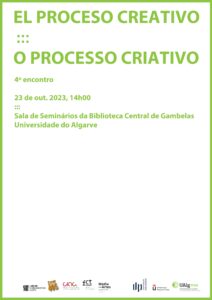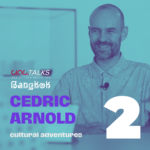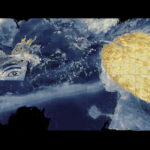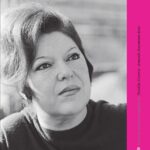EVENT

4th MEETING “THE CREATIVE PROCESS” TO TAKE PLACE ON OCTOBER 23RD AT THE GAMBELAS LIBRARY
On October 23rd, the University of Algarve will host the 4th Meeting “The Creative Process”, featuring a screening of Claudia Oliveira’s film followed by a conversation with the director. The event will also include a round table discussion on creative processes.
The program begins at 2:00 PM in the Seminar Room of the Gambelas Central Library, with the screening of Claudia Oliveira’s film, No Canto Rosa (2022, 80′), followed by a conversation with the director until 4:00 PM.
From 4:30 PM to 6:00 PM, a round table discussion on the Creative Process will take place, with participants from the Master’s program in Creative Processes and guests from the University of Beira Interior and Universidad Rey Juan Carlos, Madrid.
Synopsis of No Canto Rosa:
Francisca (a fictional name) awaits the trial of her ex-partner, accused of domestic violence against her. Claudia, Francisca’s daughter, witnessed and documented the consequences of psychological abuse inflicted on Francisca after the end of their relationship. Francisca tries to regenerate herself and rediscover her identity as a woman. This process led them to question the role of women in a patriarchal society, often placed “in the pink corner.” Check the technical sheet (here).
About the participants:
Alfonso Palazón Meseguer
Ph.D. and Bachelor in Information Sciences from the Complutense University of Madrid, he is a Full Professor at Universidad Rey Juan Carlos, where he directs the Master’s in “Documentary and New Formats”. He has worked on various audiovisual projects as a director, filmmaker, producer, and screenwriter. His audiovisual work, focused on documentaries, addresses social themes such as the meaning of life and death in the fight against disease, the reality of the LGTBI community in Spain, and the action of NGOs. In 2016, he received the Aurelio da Paz dos Reis Award for his career as a filmmaker.
Ana Clara Santos
Associate Professor at the University of Algarve, she obtained her Ph.D. in French Literature in 1996 from the Université Sorbonne Nouvelle-Paris 3. She is a member of the Theater Studies Center at the University of Lisbon and CIAC and was a founding member and president of the Portuguese Association of French Studies. She directs the theater collection “Entr’acte: études de théâtre et de performance” and co-directs, at the same publisher (Le Manuscrit, Paris), the collection “Exotopies” of APEF. She has a vast published work nationally and internationally in areas such as theatrical genetics, reception and translation of French literature and dramaturgy, and the history of Portuguese performing arts (19th century).
Ana Isabel Soares
Assistant Professor at the University of Algarve, she holds a degree in Modern Languages and Literatures from the Faculty of Letters of the University of Lisbon, with a Ph.D. in Literary Theory (2003) and post-doctorate on Portuguese cinema and poetry. She was part of the founding team of the Image in Motion Researchers Association, where she was the first President (2010-2014). Her scientific activity is related to Literary Theory, multi-artistic, film, and literary works. She publishes in Portuguese and international journals and is a member of CIAC, regularly writing for online magazines (Umbigo, Almanaque, among others).
António Costa Valente
Assistant Professor at the University of Algarve, he holds a Ph.D. in Communication Sciences and Technologies from the University of Aveiro. Since 1997, he has been directing the AVANCA Film Festival, the AVANCA|CINEMA scientific conference (since its inception in 2010), and coordinates the “Eng.º Fernando Gonçalves Lavrador Award”, annually awarded for the best academic research on cinema. He has produced and directed films that have won over three hundred awards at festivals on all continents. Among them, he produced and co-directed the first feature film in Portuguese animation. His main areas of research are Cinema, Communication Sciences and Technologies, Art Studies, and Artistic Expressions.
Carina Carmo
Assistant Professor at the University of Algarve, she holds a Ph.D. in Portuguese Literature and Culture. She has published articles in national and international journals and editions on 20th-century Portuguese authors, the neo-realist movement, and autobiographical writing, particularly on the chronicle genre. Among many other works, she published Adolescer em Clausura: Olhares de Aquilino, Régio e Vergílio Ferreira sobre o romance de internato (1998), A Visagem do Cronista. Antologia de Crónica Autobiográfica Portuguesa – Séculos XIX-XXI (2 vols., 2018), and A Noite Inquieta. Ensaios sobre Literatura Portuguesa, Política e Memória (2020).
Caterina Cucinotta
Professor at the Universidad Rey Juan Carlos, she holds a Master’s degree in Artistic Studies from the Faculty of Letters of the University of Palermo (degree, 2003) and Bologna (master’s, 2006), and completed her Ph.D. in Communication Sciences / Cinema at FCSH-NOVA Lisbon in 2015. Her thesis, Viagem ao Cinema através do seu Vestuário, was published as a book by LabCom (2018). She taught courses at the Caminhos do Cinema Português Festival, was a guest lecturer at the Faculties of Letters of the University of Lisbon, Beira Interior, and the University La Sapienza of Rome. As an integrated researcher at IHC of FCSH-NOVA, she is conducting post-doctoral research on “Costumes and spatial texture: design and art in Portuguese cinema of the last 50 years” (funded by FCT).
Cecilia Salles
Cecilia Salles is a Full Professor in the Postgraduate Program in Communication and Semiotics at PUC-SP and a Guest Professor in the Master’s in Creative Processes at the University of Algarve. She coordinates the Research Group on Creative Processes at PUC-São Paulo, and her main area of activity for the past 30 years has been Creative Processes broadly, especially in the expressive fields of Arts, Communication, and Science. She is the author of books such as Gesto Inacabado: Processo de Criação Artística (1998), Crítica Genética: Uma (nova) Introdução (2008), Redes da Criação: Construção da Obra de Arte (2006), Arquivos de Criação: Arte e Curadoria (2010), and Processos de Criação em Grupo: Diálogos (2017).
Cláudia Rita Oliveira
Graduated in Communication Design and with a degree in Editing, she attended the Cinema Studies department at FAMU (Prague) and completed post-graduate studies in Multimedia (Faculty of Fine Arts of Lisbon) and Contemporary Photography (IPA/ETIC), as well as a documentary course at Ateliers Varan, funded by the Calouste Gulbenkian Foundation. Among the works she directed, notable ones include Cruzeiro Seixas – As cartas do rei Artur (2016), which is part of the portuguese National Cinema Plan, and No Canto Rosa (2022). She worked as an editor on films such as Cesária Évora (Ana Sofia Fonseca, 2022), A Fábrica de Nada (Pedro Pinho, 2017), José e Pilar (Miguel Gonçalves Mendes, 2011), and A Caça ao Coelho com Pau (Pedro Costa, 2007). She founded the production company Madame Filmes in 2020.
Jesús Ramé
Jesús Ramé is a Professor at Universidad Rey Juan Carlos. He holds a Ph.D. in Philosophy (UNED, 2019), a master’s degree in Theoretical and Practical Philosophy (UNED, 2015), and a master’s degree in Secondary Teachers and Vocational Training in the specialization of Audiovisual Processes and Communication (URJC, 2018). His research focuses mainly on the creative processes of cinema, with particular emphasis on editing, audiovisual literacy, and the didactics
Juan José Domínguez
Juan José Domínguez is a Professor at Universidad Rey Juan Carlos, Ph.D. and graduated from the University of Seville with a thesis on the history of cinematic sound. He is a specialist in Film and Television Direction and Acting Direction. As a creator, he has produced, directed, and edited two feature films (co-directed) and numerous short films, as well as several theater plays. Currently, he continues to produce audiovisual works of various genres, maintains continuous activity as an actor and, since 2012, as a theatrical improviser. He is also a music composer and author of soundtracks. His publications focus on the production and sound and audiovisual cinematic technology.
Manuela Penafria
Associate Professor in the cinema area at the University of Beira Interior, she is a member of the scientific councils of Portuguese and Brazilian journals. She regularly participates in the organization and scientific committees of events and is a member of the Advisory Board of AIM-Association of Image in Motion Researchers, where she founded and coordinates the “Filmmakers’ Theory” Working Group. She co-edits the DOC On-line journal (UBI/Portugal; UNICAMP/Brazil).
Mirian Tavares
Mirian Tavares is an Associate Professor at the University of Algarve. Coordinator of CIAC – Center for Research in Arts and Communication and Director of the Ph.D. in Media-Art Digital. She holds a Ph.D. in Contemporary Communication and Culture from UFBA and a master’s degree in Communication and Semiotics from PUC-SP. She regularly writes for various cultural magazines, exhibition playbills, and artistic catalogs, and has curated several exhibitions. She has also coordinated and conceptually developed a set of original web series to promote sciences and arts (CIAC Talks). Her most recent research areas are Aesthetics, Media-Art Digital, Cinema, Visual Arts, and Media Literacy.
Patrícia Dourado
Patrícia Dourado is a Postdoctoral Researcher at the Center for Research in Arts and Communication (CIAC) at the University of Algarve. A guest professor in the Master’s in Creative Processes at the University of Algarve, she is a member of the Research Group on Creative Processes at PUC-SP. With a Ph.D. and master’s degree in Communication and Semiotics from PUC-SP, her studies focus on creative processes in general and those of cinema specifically, with a special focus on contemporary screenplay practices. She is a screenwriter with experience in fiction scripts, animation series, documentaries, institutional works, and digital education, and also works as an editor and reviewer of fiction and non-fiction books, magazines, didactic collections, and academic collections.







